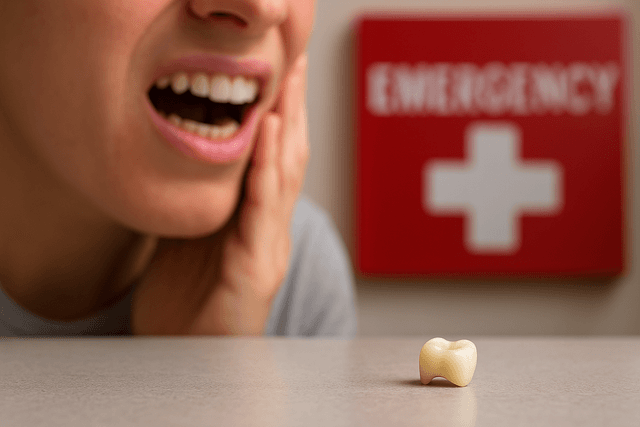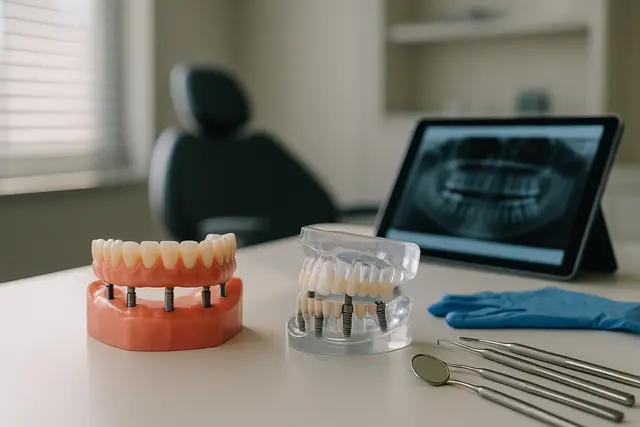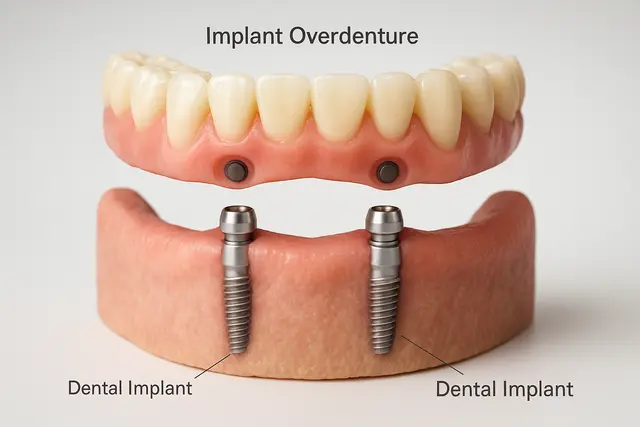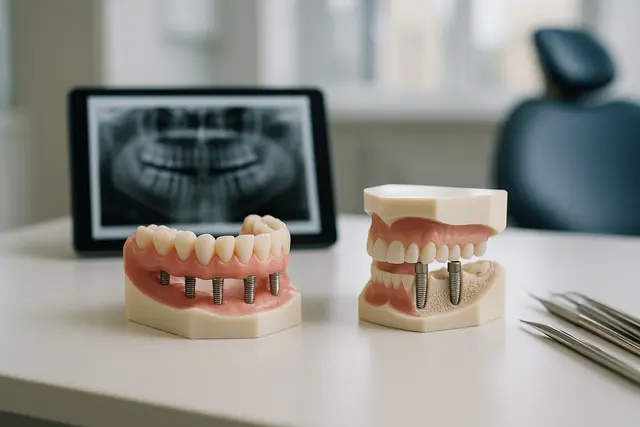Prosthodontics
5 min read
Jun 23, 2025
My Crown Fell Off — Should I See a Dentist Right Away?
There’s never a good time for your dental crown to fall off, whether it happens during lunch, while flossing, or right before an important event. It’s easy to panic or wonder if it can wait, but the truth is, a loose or missing crown isn’t something to ignore.

So, your dental crown fell off. Maybe you were chewing gum, crunching on ice, or just minding your own business when, pop, it came loose and now it’s staring up at you from your hand (or worse, somewhere you can’t find). First, don’t panic. You’re not the first person this has happened to, and it’s not the end of the world. But yes, you should see a dentist right away, and here’s exactly why.
Understanding What a Dental Crown Is and Why It Matters
A dental crown is like a little helmet for your tooth. It’s custom-made to fit over a damaged or weakened tooth, giving it structure, strength, and protection. Think of it as armor that helps you chew, talk, and smile without worrying about the underlying tooth giving out. But once that crown has come off, your tooth is exposed to everything from food to bacteria, and that’s a dental problem waiting to happen.
When a dental crown becomes loose or falls off entirely, it often means the dental cement has failed, the tooth underneath has changed, or the crown was simply nearing the end of its lifespan. Regardless of the cause, the crown and your tooth both need professional attention.
Why Crowns Come Loose or Fall Off
Crowns don’t just fall out for no reason. The crown may come loose due to several things:
Worn or weakened dental cement
Tooth decay under the crown
Tooth structure changes
Sticky or chewy foods
Teeth grinding or clenching
Age of the crown
Dental crowns can also loosen over time, especially if they weren’t properly fitted or if oral habits put too much pressure on them. And sometimes, it’s just wear and tear, crowns aren’t forever. A crown will eventually need to be replaced, and yours may be telling you that time has come.
What to Do When Your Crown Has Come Loose
First off: don’t swallow it. If you still have the crown, rinse it gently and store it in a clean container. Check the inside of the crown for signs of damage or food debris, but don’t try to clean it aggressively. If the inside of the crown looks intact, that’s good news, it might be possible to reattach it.
If the crown has cracked or broken, or if the tooth beneath looks damaged or sharp, that’s a bigger issue. In any case, call your dentist or make an emergency appointment as soon as you can.
Protecting the Tooth Until You Get to the Dentist
That exposed tooth? It’s not just sensitive, it’s vulnerable. Without the crown, chewing on that side of your mouth could lead to pain, cracking, or more decay. To protect the underlying tooth, avoid hot, cold, sweet, or hard foods until you get professional help. Stick to the other side of your mouth when you eat.
You can also use over-the-counter temporary dental cement to try and hold the crown in place if you're in a pinch, but only if you’re sure the crown and the tooth are clean and undamaged. This is a temporary fix, not a replacement for seeing your dentist.
Why You Should Contact Your Dentist Right Away
We know, life gets busy. But a lost crown is a ticking time bomb for dental problems. That exposed tooth can start to decay fast, and what might have been a simple reattachment today could become a full root canal or even an extraction later.
Even if the tooth doesn’t hurt right now, that doesn’t mean it’s safe. The underlying tooth may already be weakened, and bacteria can sneak into the tiniest cracks. To avoid further tooth damage, infection, or needing a new crown made, contact your dentist to schedule an appointment as soon as possible.
Can the Crown Be Reattached? Maybe, But Don’t Wait Too Long
If the crown and the crown tooth are both in good shape, your dentist may be able to reattach the crown using fresh dental adhesive. But if the tooth underneath is decayed or the existing crown is damaged, you may need a new crown entirely.
In either case, your dentist will need to examine the state of the crown and your tooth structure before deciding what to do. Sometimes, a temporary dental crown is placed while your permanent crown is being made. So yes, visit your dentist even if things seem okay.
What If You Accidentally Swallowed It?
Don’t panic, seriously. If you accidentally swallow the crown, it usually passes naturally without harm. Just let your dentist know, and they’ll advise whether you should wait for it to pass or go ahead and get a new crown. Most of the time, a replacement is the simplest route, especially if the crown has fallen in an unhygienic setting or you can’t find it.
How to Prevent Your Crown From Falling Off Again
Once you’ve dealt with the crown situation, let’s talk prevention. Here are some practical tips to keep your dental crown from falling again:
Avoid chewy or sticky foods that can pull the crown back off.
Don’t chew hard objects like ice, pens, or nuts on the crowned tooth.
Maintain regular dental visits for checkups and cleanings.
Practice good hygiene, brush, floss gently around the crown, and protect your crown with care.
If you grind your teeth at night, talk to your dentist about a mouthguard.
A temporary crown or existing tooth that isn’t cared for can make the crown to come loose again, so these steps really matter.
Yes, You Should See a Dentist Immediately
So, back to your original question: My crown fell off, should I see a dentist right away? The short answer is: yes. The long answer is everything you’ve just read. Whether it’s about saving the tooth beneath, preventing infection, or avoiding a full-blown dental emergency, getting professional care fast is your best move.
Even if it seems minor now, letting it slide can lead to major tooth decay, more invasive treatment, or worse, losing the damaged tooth altogether. Make an emergency dental appointment, see your dentist, and protect your tooth before things spiral.
And hey, if you’ve been putting off your dental appointment, let this be your sign to get back on track with your dental care. Your mouth will thank you. So will your future self, especially when you're chewing confidently without worrying about your crown falling out mid-bite.
What Should I Do Immediately If My Crown Falls Off?
Rinse your mouth and the crown gently with warm water, then store the crown in a clean container. Avoid chewing on the affected side and steer clear of hot, cold, or sticky foods. If available, you can use over-the-counter dental cement as a temporary fix. But remember, this is not a permanent solution, see your dentist as soon as possible.
Why Did My Dental Crown Come Loose or Fall Off?
Crowns can fall off due to weakened dental cement, tooth decay underneath, changes in the tooth structure, teeth grinding, or simply aging dental work. Chewy or hard foods can also dislodge a crown, especially if it was already loose or nearing the end of its lifespan.
Can My Dentist Reattach the Same Crown?
Possibly. If both the crown and underlying tooth are in good condition, your dentist may be able to clean and re-cement the original crown. However, if there’s damage or decay, a new crown may be needed. Prompt evaluation increases the chances of a simple reattachment.
What Happens If I Swallow My Dental Crown?
If you accidentally swallow your crown, it usually passes through your system naturally without harm. Still, inform your dentist. Most likely, you’ll need a replacement, especially if the original crown can’t be retrieved or was swallowed in an unhygienic setting.
Read Next
Related Posts

Prosthodontics
Implant Supported Dentures Overview
Missing teeth can impact more than just your smile, they can affect your confidence, comfort, and even your diet. Fortunately, modern dentistry offers a solution that’s both secure and natural-looking: implant-supported dentures. This innovative approach blends the stability of implants with the convenience of dentures to create a long-lasting, life-improving upgrade.
5 min read
Oct 29, 2025

Prosthodontics
Implant Overdentures Explained: The Hybrid Solution to Missing Teeth
Missing teeth can impact everything from your ability to eat to your self-confidence. While traditional dentures have long been a go-to solution, they often fall short in comfort and stability. Implant overdentures offer a modern alternative that combines the security of dental implants with the convenience of removable dentures, a true upgrade for those looking to reclaim their smile.
6 min read
Oct 29, 2025

Prosthodontics
Implant Retained Dentures Explained
Considering implant-retained dentures? You're not alone. As modern dentistry evolves, more people are turning to this secure, natural-feeling alternative to traditional dentures. This guide will walk you through what they are, how they work, and why they might be the solution you've been looking for.
4 min read
Oct 28, 2025
Don’t have time to research every dentist around you?
See why 30k+ patients trusted us